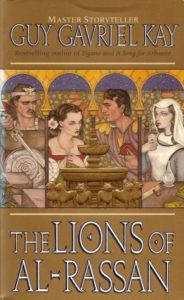
Guy Gavriel Kay, known for his exemplary prose, historical settings, and fondness for standalones, is one of those authors I’ve been hearing about for a long time. I consistently hear other authors I like (like Carol Berg, or Janny Wurts) recommend for fans of Kay. That probably works the other way as well, so I figured I’d check out one of Kay’s best-known works: The Lions of Al-Rassan.
This is definitely one of those books where the toughest suspension of disbelief comes in the obligatory “any resemblance to actual events, locales, organizations, or persons, living or dead, is entirely coincidental.” This novel takes place on a peninsula previously ruled by Esperaña before being conquered by desert warriors from across the strait. These worshippers of Ashar, the god of the stars, had set up the kalifate of Al-Rassan that has since broken up into several petty kings ruling smaller territories in the south of the peninsula, with the Esperañan followers of Jad, the sun god, split into three sometimes-warring states and backed up against the northern border of the land. Basically, it’s a thinly-veiled secondary world analogue of Moorish Spain, with the fantasy elements coming from one secondary character with modest psychic powers. I’m sure the lawyers probably insist on including that line, but I’m not sure who they think they’re fooling.
The Lions of Al-Rassan is told in an old school, third-person omniscient narration but mostly follows renowned Esperañan captain Rodrigo Belmonte, Asharite warrior poet and royal advisor Ammar ibn Khairan, and Kindath physician Jehane bet Ishak, three characters with pluralistic inclinations living in a world of sectarian hatred. Rodrigo and Ammar serve key roles in advancing their people’s claim to the peninsula and subduing their enemies, but, unlike their more zealous countrymen, both have a healthy respect for their opponents and are willing to make common cause when the circumstances warrant. Jehane, on the other hand, belongs to a third religious group, a people of Wanderers persecuted by both the Jaddites and Asharites. She wants to be able to treat patients in peace, while also desiring vengeance on those who would (or have) harm(ed) her family. But, despite Rodrigo and Ammar playing such prominent roles in regional politics, there are forces at work far beyond their control, and all three characters are forced to make the best of situations that they would not have chosen.
Kay tells the story well. His reputation for excellent prose is well-earned, and as a reader who has had mixed results with authors lauded for their prose, I was pleasantly surprised to be sucked in from the first chapter. Politics-heavy storylines often take a while to build, and there is a bit of a lull towards the middle, but this one starts with a bang. Kay builds tension before the characters are well-established with heavy use of short-term flashbacks. He will begin a chapter by partially describing the aftermath of some conflict, before flashing back hours (or days, or weeks, as the situation warrants) to detail how that conflict came about, all the while slowly filling in the pieces that deepen or correct the reader’s initial interpretation of the partial scene. I don’t think I’ve come across another book that uses this device quite so often, and perhaps it would wear thin if it were more common, but in The Lions of Al-Rassan, it really helps ratchet up tension in scenes that otherwise might’ve started as mundane. The only time I don’t think this really works is towards the end, where there’s a flashback that covers a year of in-story chronology—in that case, there’s just so much to cover that the flashback feels a bit like sketching an outline instead of painting a picture.
In addition to the expert storytelling, Kay draws nuanced, compelling major characters and generally believable secondary characters. I’m a little wary of 20th-century mindsets showing up unexplained in medieval settings, but the pluralistic characters here all have excellent reasons for being as they are—they’ve built real relationships across cultural lines that have caused them to chafe against the simplistic “us, good; our enemies, bad” beliefs of their fellows. And those cross-cultural friendships are strong and plausibly-built, as long as they don’t stray into romance, where there tends to be some insta-love between members of what seems an entire cast of enormously sexy characters.
As a 21st century American reader, albeit a religious one, I am certainly biased towards liberal values over the horrors of the allegedly holy wars perpetrated by both of the dominant cultures in The Lions of Al-Rassan, but the theming was a touch heavy at times. Kay sets religious characters who tend towards asceticism against the less devout who appreciate beauty, luxury, and the finer things in life. And while it’s easy to say that appreciating beauty is much superior to killing people of different religions, luxury as an inoculation against zeal in one’s convictions strikes me as just as much a caution as a model to emulate.
Overall, The Lions of Al-Rassan was as good as promised. The prose is exemplary, the characters are engaging, and the story grips you from the very beginning. And while I may have complaints about the romance or the theming, they’re minor when set against the quality of the novel as a whole.
Recommended if you like: historical settings, excellent prose, relatable characters on both sides of a conflict.
Overall rating: 16 of Tar Vol’s 20. Four stars on Goodreads.
